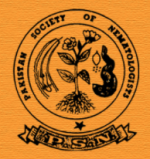Management of the Disease Complex of Okra (Abelmoschus esculentus (L.) Moench) in Screenhouse caused by Meloidogyne incognita and Sclerotium rolfsii using Trichoderma Species and Neem Cake
Management of the Disease Complex of Okra (Abelmoschus esculentus (L.) Moench) in Screenhouse caused by Meloidogyne incognita and Sclerotium rolfsii using Trichoderma Species and Neem Cake
Daniel Offiong Etim1*, Etim Johnson Umana1, Idorenyin Asukwo Udo2, Ndarake Eden Ini-Ibehe1
ABSTRACT
Root-knot nematodes and fungi are serious pathogens affecting okra production. It has been observed that okra production has not been maximized due to nematode and fungus infestation. A research into the control of Meloidogyne incognita and Sclerotium rolfsii were examined in screenhouse. One gram of Trichoderma viride at 2.40×107 CFU/g and Trichoderma harzianum at 1.40×107 CFU/g of millet were applied in combination with neem cake at 2.00 t/ha and 4.00 t/ha. Soil not amended with neem cake and not infested with Trichoderma species served as control. Two weeks old okra plants were inoculated with 5,000 larvae of M. incognita and one gram of S. rolfsii (3 Sclerotia g-3) in a heat sterilized soil. The obtained results showed highly susceptibility of okra to M. incognita and S. rolfsii infection without neem cake and Trichoderma species infestation. Amendment of soil with neem cake at 4.00t/ha in combination with T. viride significantly (P≤0.05) reduced root galling, nematode population and nematode reproduction. Soil amendment with Trichoderma species significantly (P≤0.05) reduced root galling, nematode population and nematode reproduction factor with T. viride having a higher efficacy than T. harzianum. S. rolfsii root colonization index showed that the colonization index was significantly (P≤0.05) reduced in plants grown in soil amended with neem cake and Trichoderma species compared with the control. Growth and yield attributes were significantly (P≤0.05) enhanced in plants amended with neem cake and Trichoderma species. The highest fresh pod yield was obtained on T. viride in combination with 4.00 t/ha of neem cake.
To share on other social networks, click on any share button. What are these?




